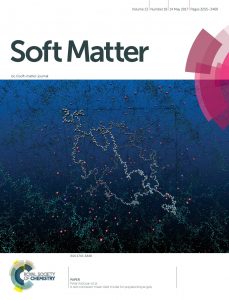Author's posts
Apr 30 2019
ESPResSo 4.0.2 released
This release provides a number of corrections for the Espresso 4.0 line.
We recommend that this release be used for all production simulations.
Please note that a sign error in tabulated interactions was fixed.
Simulation scripts which worked around this problem might have to be changed.
Below, please find the list of changes. The numbers in brackets refer to
ticket numbers on http://github.com/espressomd/espresso.
Get it in the Download area
Corrections for bugs that may harm simulation results:
- A sign error in tabulated interactions was corrected such that
the force equals the negative gradient of the potential (#2519,2520). - The flow field of the CPU lattice-Boltzmann implementation was deleted
when aspects of the molecular dynamics cell grid were changed; E.g., when
interactions, the skin or the parallelization setup were changed.
ESPResSo now terminates with an error, when this happens.
To avoid this, please setup the CPU lattice-Boltzmann after all
other aspects of the system. The GPU LB is not affected in the 4.0
release, but was affected in the current development branch (#2728, #2736). - Corrected the force acting on LB Boundaries for the case of
agrid and density not equal to 1 (#2624). - Corrected the cutoff calculation for the soft sphere interaction. In the
previous implementation, the offset parameter was ignored (#2505). - The “three point coupling” of particles to the lattice-Boltzmann method
has been removed. While it works in most environments, for some compilers
the calculation gives wrong values. This is likely caused by undefined
behavior. A corrected implementation is available in
ESPResSo’s development branch. It cannot be safely backported to 4.0.2,
because the code has diverged too far (#2516, #2517).
Users who did not explicitly activate this coupling via couple=”3pt” are
not affected. - The velocity of existing particles was changed when setting or changing
the simulation time step (#2480).
Further changes:
- Fixed the electrokinetic Python interface (#2486)
- Correction to the installation instructions for mac (#2510)
- Corrected file permissions (#2470)
- Minor corrections and extensions to the test suite (#2477, #2552)
- Fixed a dead-lock in the dipolar Barnes Hutt method on the GPU for
recent NVIDIA cards such as RTX 2080 (#2719).
Apr 27 2019
Invitation to the ESPResSo Summer School 2019
Active, Charged, and Magnetic Soft Matter Simulations with ESPResSo
Date:
Oct 7-11, 2019
Location:
ICP, University of Stuttgart, Germany
Register:
https://www.cecam.org/workshop1754/
Learn to simulate soft matter systems using ESPResSo and Python:
In this school, you have the opportunity to learn to conduct simulations in the fields of statistical physics as well as soft and active matter using the software ESPResSo (http://espressomd.org). After an introduction to particle-based simulations and the simulation software, a wide range of topics will be covered. These include colloids, polymers, magnetic fluids, and active matter. Lectures will provide an introduction to the physics and simulation model building as well as an overview of the necessary simulation algorithms such as electrostatics and hydrodynamics solvers. During the afternoon, you will practice running your own simulations in hands-on sessions. Many of the lectures and hands-on sessions will be taught by developers of the software.
The school will also provide a platform for discussion between developers and users about the future of the software. Also, users can get advice on their specific simulation projects. The final day of the school will be dedicated to research talks on projects that have been conducted using ESPResSo.
Espresso is an open-source particle-based simulation package with a focus on coarse-grained molecular dynamics models. In addition, it offers a wide range of schemes for solving electrostatics and magnetostatics, hydrodynamics, electrokinetics, as well as algorithms for active matter, rigid bodies, and chemical reactions. ESPResSo consists of an MPI parallelized simulation core written in C/C++ and a scripting interface in Python. This allows for good interoperability with other scientific and visualization tools for Python.
Attendance to the summer school is free. Unfortunately, we cannot offer travel stipends. We recommend that you book your accommodation early, since there is a fair (Canstatter Volksfest) at the same time. We have blocked a few inexpensive rooms in Stuttgart. If you are interested, please contact Henriette Patzelt (secretary@icp.uni-stuttgart.de).
Jun 12 2017
Online Documentation
We are switching from the document based User Guide to a Online Documentation with examples, development instructions and cross references to the python interface code.
Jun 01 2017
Soft Matter, Issue 18, 2017
The Cover of Soft Matter, Issue 18, 2017 shows a
polyelectrolyte gel simulated with ESPResSo.
Find details in the article:
“A self-consistent mean-field model for polyelectrolyte gels”
by Oleg Rud, Tobias Richter, Oleg Borisov, Christian Holm
and Peter Košovan
Jun 07 2016
Recent publications citing ESPResSo
Check the Publications section for highlight publications and the complete Scopus RSS feed.



